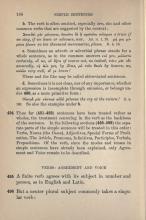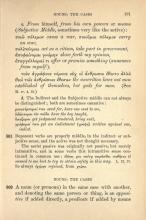495. A finite verb agrees with its subject in number and person, as in English and Latin.
496. But a neuter plural subject commonly takes a singular verb.
Πολλὰ τῶν ὑποζυγίων ἀπώλετο.
Many of the baggage-animals died.
Xen. Anabasis 1.5.5
But also:
ἅπαντα ἦσαν εὐώδη.
All were sweet-smelling.
Xen. Anabasis 1.5.1
ἦσαν ταῦτα δύο τείχη.
These were two walls.
Xen. Anabasis 1.4.4
497. A dual subject may take a plural verb.
Ἀδελφὼ δύο μόρον κοινὸν κατειργάσαντο.
Our two brothers wrought their common death.
Soph. Antigone 55–57
498. The agreement often follows the sense instead of form; but sometimes it follows the form instead of sense.
a. Tὸ πλῆθος οἴονται
the multitude suppose (Agreement with a collective subject)
Thucydides 1.20
b. Bασιλεὺς καὶ οἱ σὺν αὐτῷ εἰσπῑ́πτει.
The king with his followers breaks in.
(The king is thought of as the central figure.)
Xen. Anabasis 1.10.1
c. Ἔπεμψέ με Ἀριαῖος καὶ Ἀρτάοζος.
Ariaios and Artaozos sent me. (Agreement with the nearer noun only)
Xen. Anabasis 2.4.16
d. Tὸ μέσον τῶν τειχῶν ἦσαν στάδιοι τρεῖς.
The space between the walls was three stades. (Agreement with a predicate noun)
Xen. Anabasis 1.4.4
499. The Active and Passive voices have the same force as in English.
a. Some active verbs are used as passives of other verbs.
500. The Middle voice expresses an action of the subject.
a. On himself, as direct object (Direct Middle).
| παύω make stop |
παύομαι stop myself, cease |
| φαίνω show |
φαίνομαι show myself, appear |
| ἵστημι set up (cp.§ 363) |
ἵσταμαι place myself |
| πείθω persuade |
πείθομαι persuade myself, believe |
| διδάσκω teach |
διδάσκομαι teach myself, learn |
| ἅπτω fasten |
ἅπτομαί τινος fasten myself to something, touch |
| ἔχω hοld |
ἔχομαί τινος hοld myself to, cling to, am next to |
b. For, to, with reference to himself (Indirect Middle).
| ἄρχω am first |
ἄρχομαι begin for myself, begin my task |
| ποιῶ make |
ποιοῦμαί τινα φίλον make one my friend |
| ἄγω lead |
ἄγομαι γυναῖκα take to myself a wife, marry |
| βουλεύω plan |
βουλεύομαι plan for myself, deliberate |
| συμβουλεύω advise |
συμβουλεύομαι seek advice |
| αἱρέω take, seize |
αἱροῦμαι take for myself, choose |
| φυλάττω watch, guard |
φυλάττομαι am on my guard |
c. From himself, from his own powers or means (Subjective Middle, sometimes very like the active).
ποιῶ πόλεμον
cause a war
ποιοῦμαι πόλεμον
carry on war
πολῑτεύομαι
act as a citizen, take part in government
ἀποφαίνομαι γνώμην
show forth my opinion
ἐπαγγέλλομαί τι
offer or promise something (announce from myself)
τοὺς ἀγράφους νόμους οὐχ οἱ ἄνθρωποι ἔθεντο ἀλλὰ θεοὶ τοῖς ἀνθρώποις ἔθεσαν.
the unwrttten laws not men established of themselves, but gods for men.
(see Xen. Memorabilia 4.4.19)
d. The indirect and the subjective middle can not always be distinguished; both are sometimes causative.
μεταπέμπομαί τινα
send for, have one sent to me
διδάσκομαι τὸν παῖδα
have the boy taught
δικάζομαι
get judgment rendered, bring suit
γράφομαί τινα
get an indictment (γραφή) written against one, indict
501. Deponent verbs are properly middle, in the indirect or subjective sense, and the active was not thought necessary. The aorist passive was originally not passive, but merely intransitive, and in some verbs this intransitive sense continued in common use.
ἐδόκει μοι ταύτῃ πειρᾶσθαι σωθῆναι.
It seemed to me best to try to attain safety in this way.
Lysias 12.15
So always ἐχάρην (rejoiced), from χαίρω.




